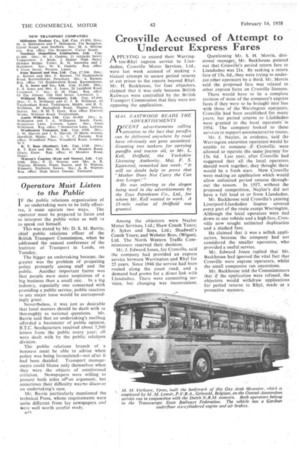Operators Must Listen to the Public
Page 50

If you've noticed an error in this article please click here to report it so we can fix it.
IF the public relations organization of I an undertaking were to be fully effective, it must operate two ways. The operator must be prepared to listen and to interpret the public voice as well as to speak out himself.
This was stated by Mr. D. S. M. Barrie, chief public relations officer of the British Transport Commission, when he addressed the annual conference of the Institute of Transport in Leeds, on Tuesday.
The bigger an undertaking became, the greater was the problem of projecting policy promptly among staff and :he public. Another important factor was that people were more suspicious of a big business than a small one. In a big industry, especially one concerned with providing a public service, public reaction to any major issue would be correspondingly great.
Nevertheless, it was just as desirable that local matters should be dealt with as thoroughly as national questions. Mr. Barrie said that an undertaking's mailbag afforded a barometer of public opinion. B.T.C. headquarters received about 7,500 letters from the public every year; all were dealt with by the public relations division.
The public relations branch of a business must be able to advise when policy was being formulated—not after it had been decided. Transport managements could blame only themselves when they were the objects of uninformed criticism. Newspapers were willing to present both sides °Fan argument, but sometimes their difficulty was•to discover an undertaking's case.
Mr. Barrie particularly mentioned the technical Press, whose requirements were quite different from lay newspapers and were well worth careful study.




















































































































